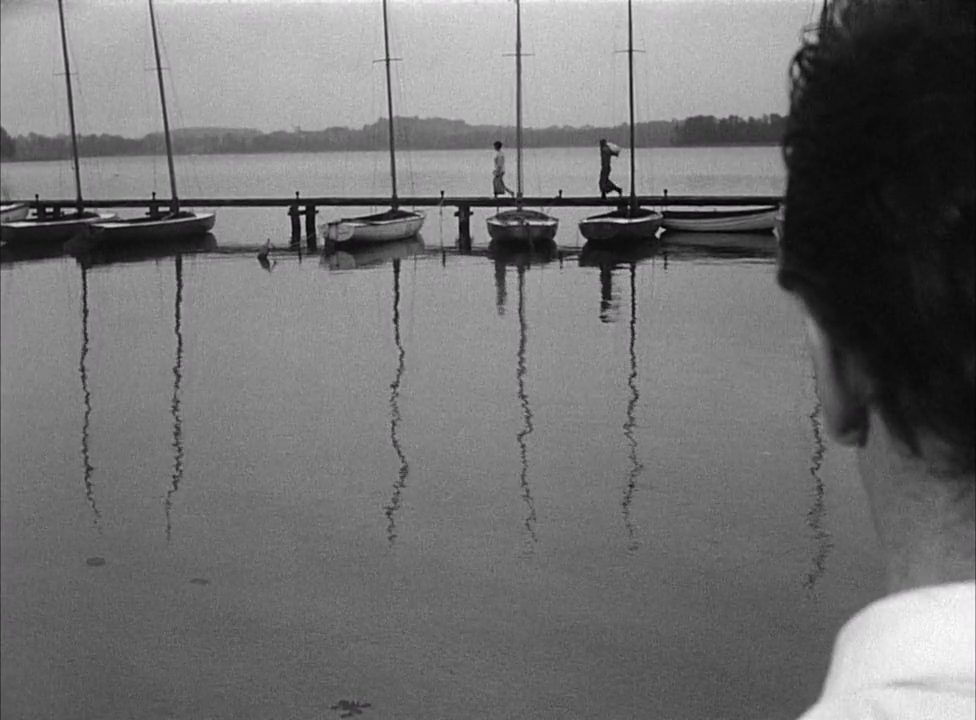|
Genres, Themes, Actors, and Directors:
- At Sea
- Marital Problems
- Masculinity
- Rivalry
- Roman Polanski Films
Review:
Peary writes that “Roman Polanski’s first film, his only Polish film, is an enigmatic three-character piece he wrote with Jerzy Skolimowski and Jakub Goldberg”, which “concentrates on the stiff competition between the two men [Niemczyk and Malanoqwicz] at sailing, at pickup sticks, at knife playing”. He points out the “sense of claustrophobia (heightened when they go below) that dramatically builds tension; just as the wind determines the boat’s movements, fate seems to control the characters” — and while “we expect that in this natural setting the characters will lay bare their deepest emotions”, they “never really strip off their defenses and totally reveal themselves”. Peary further notes that “Niemczyk desires to show off for his wife and to himself by humiliating the younger man; but while he wins his small victories, he seems increasingly infantile” — and ultimately, the “immense problems in the relationship between Niemcyzk and Umecka… come to [the] surface” and must be confronted. Other than pointing out Jerzy Lipman’s “excellent hand-held photography”, however, Peary’s review neglects to highlight the visual strengths of this unusual and surprisingly potent chamber piece — including and perhaps primarily its camera angles, strategic blocking of characters, and highly effective editing. While this isn’t a film I would choose to return to repeatedly, it should be seen at least once for its technical brilliance.
Redeeming Qualities and Moments:
- Solid direction, cinematography, and editing throughout



Must See?
Yes, as Polanski’s worthy debut feature.
Categories
Links:
|
One thought on “Knife in the Water (1962)”
A tentative once-must for Polanski fans who are curious about his first feature film.
I’d seen this only once before (years ago) – and now I know why I haven’t returned to it in all this time. Ultimately, I’m just not all that sold on it.
The points in the assessment about the (mildly) macho power-play are well-taken and apparent. But, even if you’re a real fan of Polanski’s work (as I am), this flick requires a lot of patience.
Much of it is just not all that interesting. The film’s exposition is particularly awkward and not all that convincing in its set-up. The dialogue in the first 20-30 minutes seems to suggest that we’re to view the film in almost-absurdist terms – and not see the male characters (at least) as real people (since what they’re saying is hard to make sense of). Fortunately, more realistic speech patterns eventually kick in – so we can abandon the absurdist theory.
But that still doesn’t help the rest of the film as it plods along. We do (admittedly) notice Polanski’s technical skill (and that of his DP); it can’t have been easy making something filmed on water looks this smooth. That’s impressive, to be sure.
But (aside from one mild ‘action’ sequence) it’s only near the end that the film gains something like momentum – when we realize that the husband and wife are finally forced to have what is probably the first meaningful conversation they’ve had in a long time (this in contrast with the film’s opening scene of the two of them driving along – with basically nothing to say to each other). Serving to underscore that, the film’s final shot is nicely open-ended.
Personally, what impressed me most was the score by Krzysztof Komeda. Polanski would collaborate with the composer again for ‘The Fearless Vampire Killers’ and ‘Rosemary’s Baby’. Reportedly, Komeda had also done a score for ‘Chinatown’ – which was rejected by producer Robert Evans for a more ‘commercial’ score by Jerry Goldsmith. Nothing against Goldsmith’s memorable work but what Komeda displays (particularly) in ‘Knife’ suggests that he could easily have complemented ‘Chinatown’.